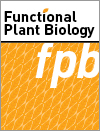The world population is increasing and food producers need to increase production. Drought stress is the main obstacle to producing more food, particularly in arid and semi-arid areas, where it is also aggravated by climate change. The results of our study indicate that spraying grapevines with cost-effective supplemental material is very effective in decreasing the adverse impacts of drought.

Functional Plant Biology
Volume 51 Number 10 2024
Photochemical adaptations of six C4 xero-halophytes reveal diverse strategies to endure salt and water fluctuations in native habitats. Variations in photochemistry, photoprotection, and photoinhibition indicate modulation of PSII photochemical efficiency. Different xero-halophytes exhibit distinct mechanisms for maintaining photochemical efficiency through dynamic control of plastoquinone pool redox states, excess energy dissipation, and shutdown mechanisms in response to environmental challenges.
In this study, we showed that cerium oxide nanoparticles (PNC) promoted lateral root formation in Arabidopsis thaliana by modulating reactive oxygen species and Ca2+ distribution in both primary and lateral roots. Results indicated that applying PNC to plants have potential to improve the development of root system and thus overall plant growth performance. Adopting nanobiotechnology to stimulate plant root system may be beneficial to sustainable agriculture.
FP24196 Abstract | FP24196 Full Text | FP24196PDF (4.7 MB) | FP24196Supplementary Material (718 KB) Open Access Article
This study investigated the physiological and biochemical effects of foliar application of Si and Zn nanoparticles (NPs) on fennel (Foeniculum vulgare) plants under different irrigation levels. Si NPs and Zn NPs improved chlorophyll and water content of plants, and superoxide dismutase activity under drought stress, but essential oil content generally decreased by severe drought (50% field capacity). Superoxide dismutase and catalase activities were sensitive to drought, making them potential markers for monitoring fennel under drought stress.
Excessive light can be detrimental to plant growth. To overcome this, plants employ photoprotective non-photochemical quenching (NPQ) mechanisms. This study evaluated NPQ kinetics and growth of six cassava (Manihot esculenta) varieties under natural and intermittent high light conditions. Exposure to high light significantly affected biomass production, chlorophyll content, and photosynthesis, with the variety ‘Sree Suvarna’ demonstrating the highest yield across all conditions. Identifying cassava varieties with effective NPQ regulation could improve photosynthetic efficiency and enhance crop resilience, supporting sustainable agricultural productivity.
Australian saltbush (Atriplex spp.), used for pasture in semi-arid areas, survive in exceptionally salty environments, but little is known about how salinity affects the root morphology and root exudates. We discovered that saltbush have closed-type root apical meristems and release limited sugars as root exudates, maintaining root:shoot ratio even at extreme salinity. These findings offer new insights into saltbush resilience and encourage further research into their unique root properties.
FP24178 Abstract | FP24178 Full Text | FP24178PDF (3.5 MB) | FP24178Supplementary Material (6.6 MB) Open Access Article
The leaf ontogeny in Saraca asoca usually occurs once in a year and involves variation in PSII function. The developing leaves metabolically switch from heterotrophy to autotrophy. During leaf development, the carotenoids are accumulated earlier than chlorophylls. With the development of leaf, the PSII function improves leading to increased efficiency of oxygen evolving complex and photoelectron transport.
The China rose (Rosa chinensis) is known as the ‘queen of flowers’, and is commercially cultivated globally. To enable breeders to develop varieties tolerant to alkaline soils, we investigated the genes involved in their stress response. This research will also contribute to the broader understanding of plant stress responses and offer potential avenues for enhancing stress tolerance in crop species.
Understanding how seedlings respond to stress from salt and alkalis can help inform strategies to boost plant performance in adverse environments. We examined how these stressors affect rice seedling physiology and gene expression. Genes that respond to salt and alkali stress are mainly involved in hormone signalling, and in the synthesis and metabolism of organic acids. These findings will contribute to engineering stress-tolerant crops.





